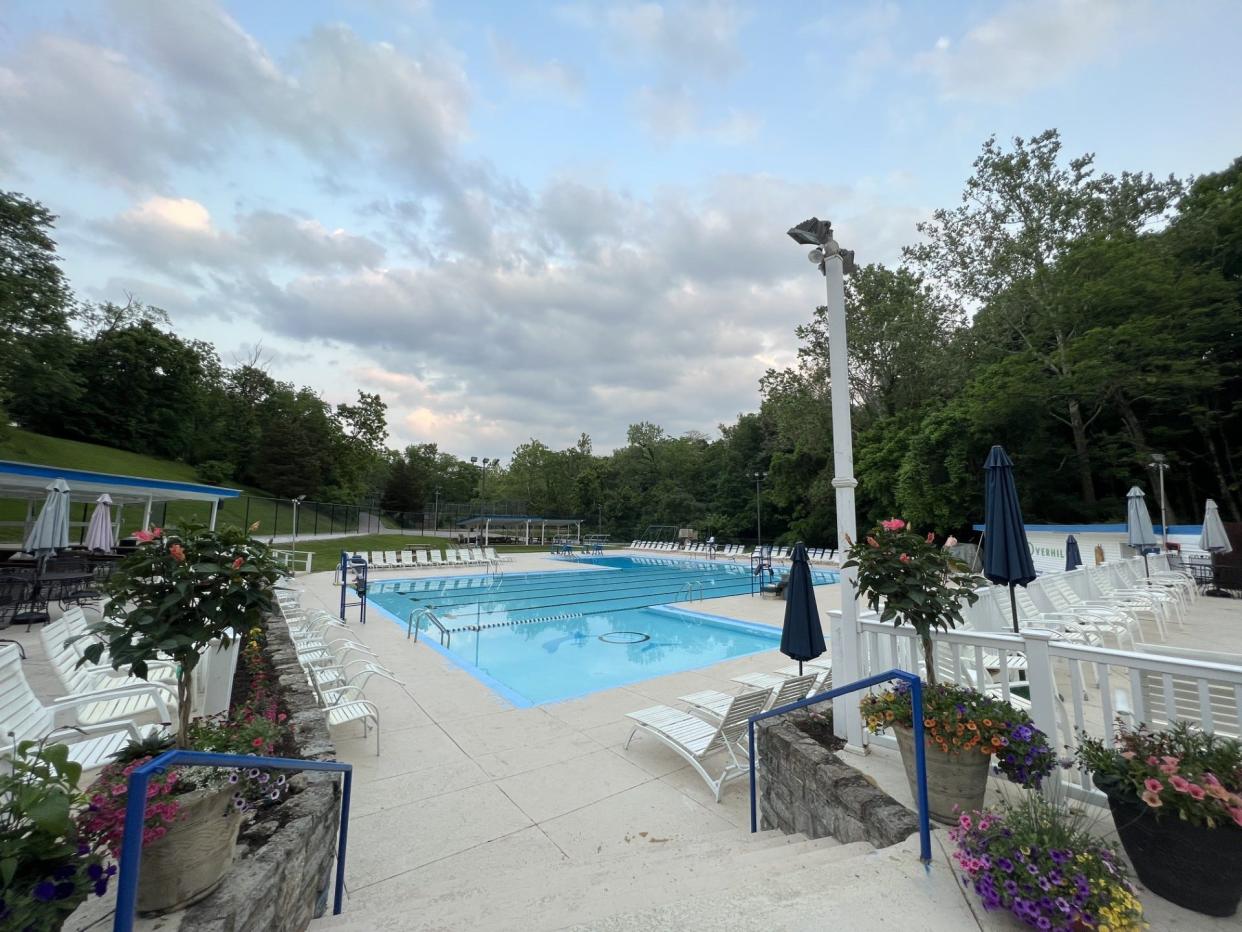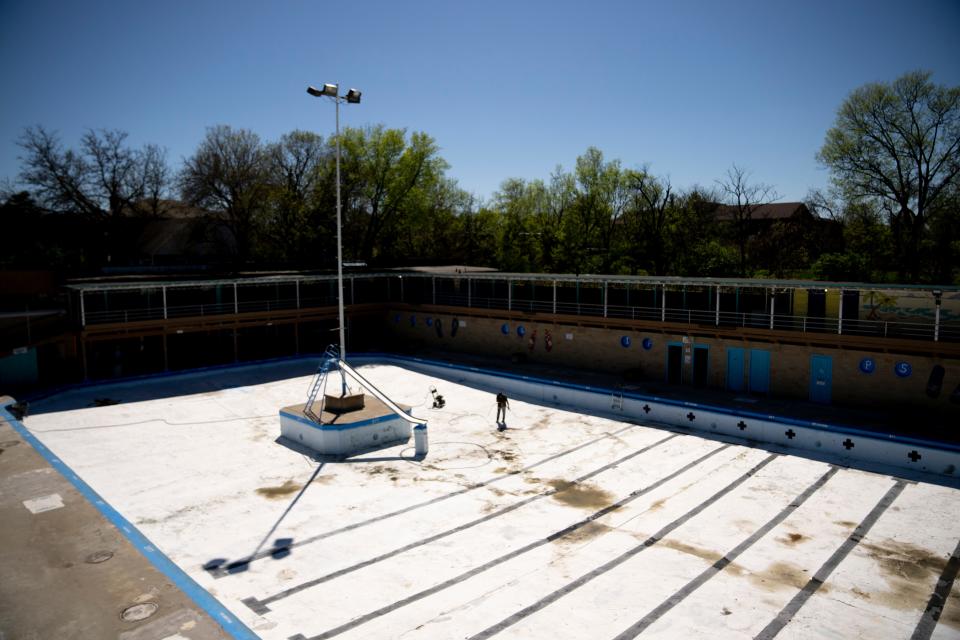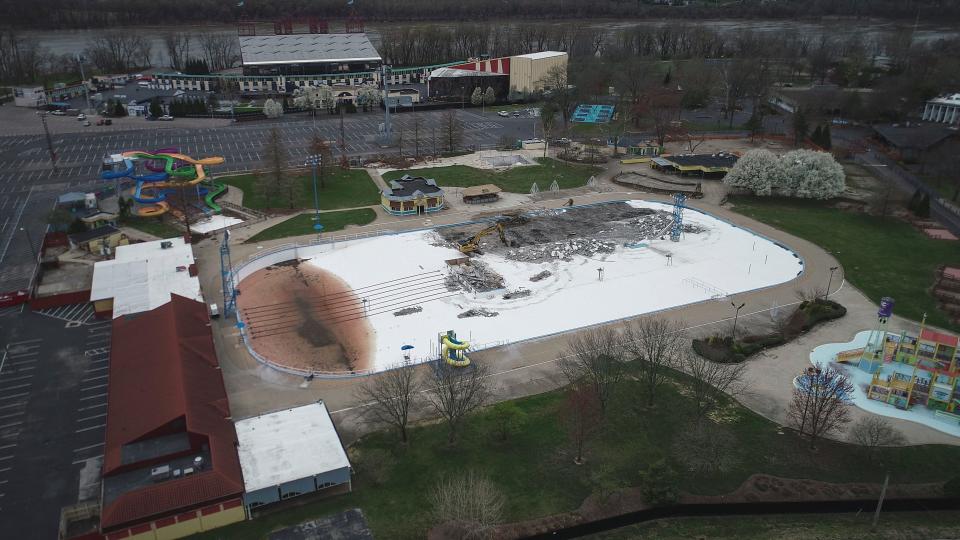For Greater Cincinnati swim clubs, summers of fun but '365 days of bills'

Fans of Coney Island’s Sunlite Pool were crushed that their $146,000 offer to buy and run the 98-year-old icon of Cincinnati summer failed.
But they may have saved themselves buckets of cash and gallons of sweat equity in losing their last-minute gambit to save Sunlite this spring.
Owning and running a pool, it turns out, is expensive and time-consuming, requiring year-round effort in hopes of three months of fun in the sun.
“While we’re only open 100 days of the year, we have 365 days of bills,” said Coy Baker, president of the board at Oak Hills Swim & Raquet Club.
That’s the case for all of Greater Cincinnati’s two dozen-plus swim clubs, most set to open for the season Memorial Day weekend. While the majority of the region’s 1,800 pools are run by cities, hotels, apartment complexes, country clubs and other businesses that can absorb their costs, swim clubs have only member dollars to stay afloat.
Some years, that’s hardly enough.
Club pools good for family, friends
Philipps Swim Club opened in West Price Hill just four years after Sunlite opened at Coney. Founded in 1929, the pool is one of the city’s oldest and, at 500,000 gallons, largest.
“Growing up, this is where I met a lot of kids,” said Jim Donovan, a 74-year-old physician and president of the Philipps’ board.
Donovan’s mother sent him and his nine siblings to the pool starting in 1962, knowing they’d be safe. Five of them joined the swim team. Four are still club members.
Board secretary Chrissy Miller has been a member nearly as long. “I’m 52 and I’ve belonged for 52 years,” the middle school teacher said. She worked there, as did her daughters and a niece. “There’s a lot of family running through.”
Family and friends are a chief draw to club pools. At Delshire Swim Club in Delhi Township, board member Petra Demeter’s son met his best friend at the pool nine years ago. At Delhi Swim Club, also in Delhi Township, board member Susan Hartung’s family joined in 2007, after a son attended a poolside birthday party.
“A lot of members who volunteer do it for the kids, not just their own, but for all the kids who have grown to love the pool and made friends there,” said Denise Gabrelski, a Delshire board member.
Other common lures: Kids learn to swim, a life-saving skill. They learn the value of group sports on swim and dive teams. They’re in the company of adults who watch out for them – and share their sunscreen. And even at $400 to $800 for an annual family membership, they’re more affordable than country clubs, with bargains at the snack bar and “coolers welcome” policies.
But while patrons sit, sip or swim, the mostly volunteer crews who run pools scramble to keep them filled.

Chlorine, leaky pipes among endless costs
At 95 years old, the Philipps pool is showing its age. A pump had to be replaced last year. Some 25 volunteers – "not enough,” board president Donovan said – started up again this year in February, repairing chairs, patching concrete, painting the pool, removing debris and fixing damage caused by vandals.
Faced with those financial burdens, Philipps’ owner planned to sell the pool in 2011. Donovan and friends stepped up and formed a not-for-profit group to take over the management – and bills. “We didn’t know what we were getting into,” he said.
On top of routine maintenance, club pools struggle to pay for:
Chlorine. The price of this essential pool chemical has doubled since 2020. That’s when a fire put the nation’s second-largest maker of chlorine out of commission, just as COVID slowed delivery of goods across the country and Americans headed to pools to get out of lockdowns at home. Prices reacted to the tight supply and rising demand.
Hourly employees. Competition for teen labor has pushed up wages for lifeguards and other pool workers. This year, club pools are also facing new competition from Cincinnati’s city pools, with the city bumping the starting pay for lifeguards from $12.95 to $16 an hour. With the increase, the city has enough guards to open all 24 of its pools this year, the first time since 2019.
Essential repairs. Delhi Swim recently took a $200,000 loan for a pipe repair. In the last few seasons, Overhill Swim Club in Delhi Township has shelled out for a pool liner and filtration system, new fencing and sidewalks, and parking lot improvements. In Covington, city leaders in April voted to close Goebel Pool (slated for removal as part of the Brent Spence Bridge Corridor Project) rather than spend an estimated $500,000 to fix its leaks.
Unexpected emergencies. Oak Hills Swim & Raquet Club now has an unheated pool, deciding against replacing a broken heat pump in 2020. Delshire supporters launched a GoFundMe campaign after they learned a former board member, accused of embezzling thousands of dollars about four years ago, did not pay a $16,500 water bill. Green Township’s Woodhaven Swim Club also turned to GoFundMe this year to cover rising property taxes and other expenses.
“People don’t realize what it takes to keep these pools going,” Woodhaven board president Beth Abernathy said.

'Pools are back. They're busy.'
To stay solvent – and hold down membership fees – most clubs run fundraisers all year. Among them: Split the pot, merchandise sales, Friday night cookouts, Bengals watch parties.
With a dip in members, Delhi Swim Club has staged trivia contests and movie nights, sold pizza discount cards and basket raffle tickets, and recruited seven area businesses as sponsors. “Every little bit helps,” said Hartung, the board’s fundraiser.
Some clubs increase what it costs to join. Oak Hills resumed an initiation fee it earlier suspended. Mount Lookout Swim Club raised membership dues this year to cover rising expenses.
Four years out from COVID disruptions, however, member pools are generally in good shape, said Shane Wiggins, president of Cincinnati-based SwimSafe Pool Management. This year, they've dodged another hike in chlorine prices and are filling their lifeguard openings. "Pools are back," Wiggins said. "They're busy."
Some pools can't even keep up with demand – including Anderson Hills Swim & Tennis Club, with 194 names on an online waitlist, and Mount Lookout, which said more than 500 families want a spot.

Coney members seek new clubs to build memories
A group calling itself Save Coney Islanders secured $146,454 in pledges in less than 48 hours in March to buy Coney’s Sunlite Pool.
Cincinnati Symphony Orchestra, which bought Coney last year to install a new music venue at the site, razed Sunlite a few days later – and the Save Coney Facebook page exploded with both anger and memories.
Nancy Flammer of Anderson Township wrote a Sunlite obituary, celebrating it for affordable fun, summer jobs and life-saving swim lessons. “She was just that one and only kind of pool – a constant companion and source of great joy.” Sunlite could have been saved with new strategies, added fellow advocate Rebecca Schrand of Mount Washington. Like libraries, parks and public transportation, she said, pools “may need to be propped up by the community.”
Remnants of Sunlite, meanwhile, live on. One fan bought its Silver Bullet slide and set up a Facebook page to find it a new home. Two others are compiling a book titled “To Coney With Love,” with contributions due by May 27.
And maybe best of all for other membership pools, Sunlite members are looking for new places to swim.
Batavia Swim Club picked up 30 new members this year, many from Coney. Board President Karie Gipson hopes they are not disappointed. “We are not Coney,” she said. “We are not fancy ... just fun.”
Delhi Swim Club hopes for a similar Sunlite spillover. “As much as I hated to see Coney close,” fundraiser Hartung told radio station Q102 in March, “I hope it gets us some members.”

This article originally appeared on Cincinnati Enquirer: Club pools struggle to stay afloat